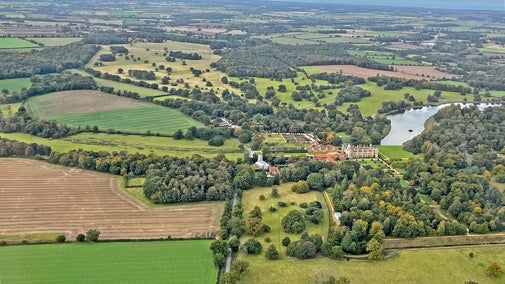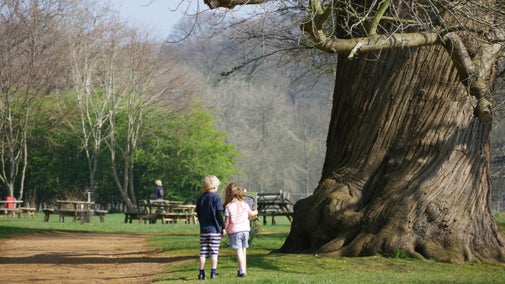2023
Streams, eels, ponds, trees, schools, invasive species and hedges
Felbrigg stream restoration
Spring 2023 saw the completion of the restoration of the stream below Felbrigg lake. A project that has taken many design turns over the last few years finding a balance between current ecology, land management and archaeology. The final project has seen improvements to the footpath and field track, opening a new culvert alongside an older brick archway. This will help support access for both people, animals and our farmer, but also prevent soil from entering the stream from the previously boggy crossing.
It has also seen a full restoration of the valley floor. The channel has been blocked in places to raise the bed and encourage water to move through the valley floor more naturally than in one straight channel. This has been complimented by the creation of a series of scrapes and ponds through the floodplains to hold water in the winter, creating wetlands for invertebrates, amphibians and over wintering birds. We’re excited to see how the project develops through the next few seasons and what fauna and flora starts to call it home.
Protecting Eels in the Bure
In August we learnt that our Riverlands Upper Bure Project had been successful in securing £258k from the Species Recovery Program administered by Natural England to improve habitat for eels in the Upper Bure. Eels are an iconic species to our river systems but have suffered huge declines since the 1980s with an estimated 95-98% reduction in glass eel recruitment from pre-1980 levels. This has led to the species being classified as Critically Endangered on the IUCN red lest species. Efforts to support the species have focused on reducing fishing pressure, restocking, restoring habitat connectivity and improving available habitat. This project focuses on the latter two elements looking to improve habitat connectivity and improving available in-channel and supporting floodplain habitats. Projects will largely be delivered in the Autumn of 2024.
Pond creation and restoration
We have continued to work with Norfolk Ponds Project creating three new ponds and maintaining six previously restored ponds at Heydon, bringing the pondscape total of the area up to 28 ponds. Post restoration monitoring has revealed major increases in wetland plant diversity as well as the appearance of many rare species including Water Violet (Hottonia palustris), Grass-Poly (Lythrum hyssopifolia) and Clustered Stonewort (Tolypella glomerata). The protected Great Crested Newt is rapidly expanding its distribution in the project area and major significant increases in bat activity (amongst water-associated species) have been recorded. This work is supported by Riverlands, Natural England and University College London.
Work with Sidestrand school
This year our Felbrigg Children and Young People Hub has been working with Sidestrand School and local expert Martin Scaiff to get children connected to the landscape through environmental listening. With monthly visits to various locations, students have worked to record the nature sounds they have experienced. These have then been worked into podcasts by Martin which have been broadcast by Poppylands radio. Catch the show on Wednesday afternoon at 1pm, the live mics on Wednesday at 10pm on Riverlands (poppylandradio.co.uk) Or catch up on missed episodes at HomeSounds Poppyland shows | Mixcloud
Planting 13,000 trees at Blickling
During winter 2023, the team on the Blickling Estate planted over 13,000 trees which will support wildlife corridors, connect existing habitats, and improve water quality. Tree species were selected that are ecologically suited to the site and considering our changing climate. A mix of traditional whips or small trees were planted and an area next to the river was left for natural seeding and regeneration to take place. The trees were planted thanks to funding from the European Woodland Creation Offer.
Supporting school visits to Felbrigg and Sheringham
Working with Schools and engaging young people with nature has been a core part of the work at Sheringham since 2005. Before covid the site would see around 6000 educational visitors a year, each coming to take park in guided activities to learn about the natural world around us. The covid-19 pandemic changed this, like so many other things, stopping visits throughout 2020 and 2021. Supporting schools back to these visits has been a huge challenge which saw Sheringham seek funding from the HSBC ‘Access to Nature’ Project in 2022 which enabled us to pay for transport and additional equipment needed to support the sessions. This was hugely successful and Riverlands was delighted to be able to continue this great initiative through 2023. With Riverlands support, over 800 pupils from 15 schools were able to take advantage of our skills and facilities to learn about nature.
70 tonnes of Himalayan Balsam removed
Our continued efforts to control the Invasive species Himalayan Balsam (Impatiens glandulidera) are starting to pay off. Since expanding our program of works in 2021 to include contractor support as well as the tremendous efforts made by the Blickling Countryside Team and volunteers we have pulled an estimated 70 tonnes of balsam and are seeing dramatic declines in the density of the plant in areas along the river bank. Although manual and intensive, the process of hand pulling the plant allows us to sensitively and selectively remove it whilst protecting other native flora and reduces the disturbance on wildlife and nesting birds. As the team combed the banks for Himalayan Balsam, they encountered previously unknown populations of other invasive plants: the odorous Skunk Cabbage Symplocarpus foetidus, a towering Giant Hogweed Heracleum mantegazzianum, and the notorious perennial New Zealand Pigmyweed Crassula helmsii. All now formally recorded, and appropriate action taken.
At times, an unexpected chorus of Pelophylax frogs, an introduced bright green species, accompanied the work. Records like these are important, as little is known about their numbers, rate of spread and impact on native wildlife.
New farm hedges at Ingworth
Braving the cold and wet this winter, Norfolk Rivers Trust and their volunteers, supported by National Trust volunteers, planted 1500m of hedge on one of our tenant farms at Itteringham on the Blickling Estate. Planting over 8000 plants, the new hedge will provide habitat, link existing hedge and woodland habitat and protect the arable fields from windblown erosion. It will also provide a buffer against water run-off carrying a high soil load from entering the river.







